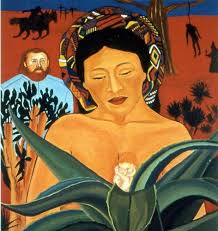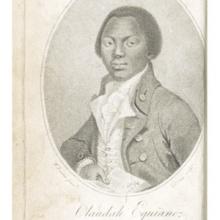North/Central America

Dona Marina, Cortes’ Translator: Painting, Santa Barraza
A representation of Malinche painted by a renowned Chicana visual artist and teacher from Texas. It depicts the beautiful, life-giving Malintzin, is a tiny image, crafted on metal, and meant to evoke ex-voto and other devotional images from Mexico.

Short Teaching Module: Childhood and Transatlantic Slavery
Especially useful in helping to place slavery in a world history perspective is one of the first slave narratives, The Interesting Narrative of the Life of Olaudah Equiano or Gustavus Vassa the African, originally published in 1772.
The White House evaluates Soviet Intelligence Capabilities
In the final months of his presidency, shortly before the official dissolution of the Soviet Union, George H. W. Bush instructed the leaders of the US intelligence community to completely reevaluate their raison d'être.
Puerto Rican Labor Movement: Newspaper, Needle Worker Strike
This is an excerpt from article published in the newspaper, La Democracía. This article shows how the labor press was an important source of information for the working class. The use of the press created a sense of solidarity among the workers on the island and around the world.
Puerto Rican Labor Movement: Magazine, Eleanor Roosevelt
After her trip in the Caribbean in the summer of 1934, Mrs. Roosevelt, who had a column in the magazine Women’s Home Companion, recorded her impressions of Puerto Rico, including the island’s people and culture.
Early Modern Period: Nonfiction, Jesuit Relations
This excerpt comes from a 1639 letter written by Mother Marie de Saint Joseph, a French Ursuline nun in Canada.
Reacting to German Reunification
On October 3, 1990, the German Democratic Republic (East Germany) and the Federal Republic of Germany (West Germany) were reunified as one single state, recreating a country that had not existed since the end of World War II.
A Positive American View
Benjamin Franklin Bache, grandson on Benjamin Franklin, was a supporter of Jefferson’s Republican Party. His sympathetically summarized the situation in France during the period when Louis XVI was put on trial and executed.
The Pennsylvania Gazette: U.S. Vigilance (13 December 1797)
The Haitian uprising stoked the fears of whites in the United States that a similar uprising would occur among enslaved populations in their country.
The Pennsylvania Gazette: Unrest Continues (28 September 1796)
This newspaper details how despite the abolition of slavery in Haiti, turbulence continued in many parts of the colony. The French relied on local generals, including Toussaint L’Ouverture, to try to restore order.